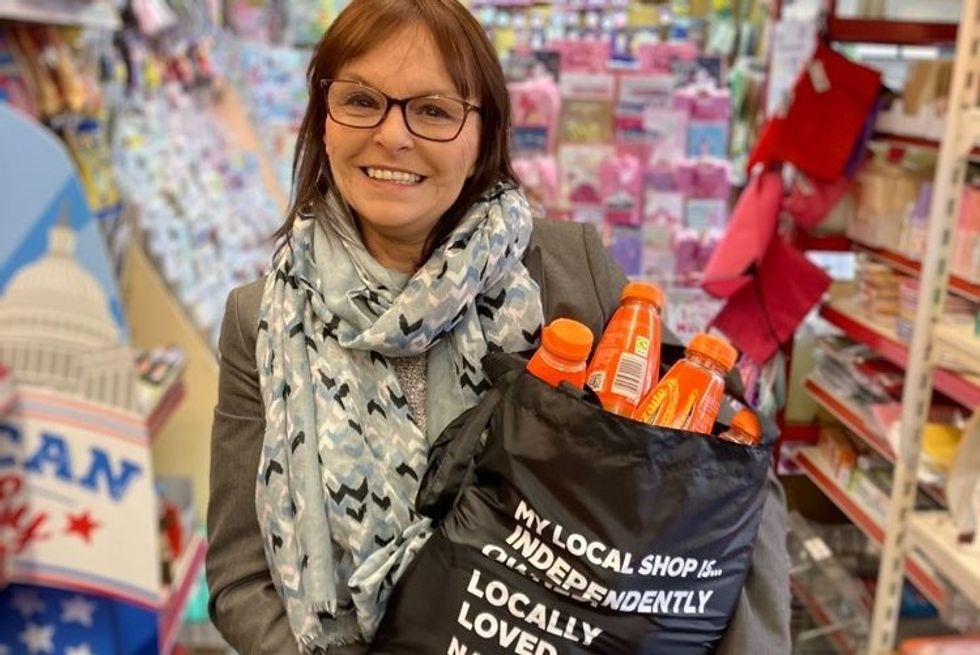The potential rise in the National Living Wage (NLW) to £12.10 could be a “tipping point” for many convenience stores and wholesalers unless the UK government steps in with targeted tax relief, support and grants.
The Low Pay Commission (LPC) is on track to raise the national living wage to £12.10 an hour in April 2025, with the possibility of suggesting an even higher rate before the budget following Labour's adjustment of its mandate to secure a "genuine living wage". Young workers are likely to get an even bigger increase as ministers say that 18 to 20-year-olds should be paid the same as those older than 21.
While this has been praised as "good news" for low-wage workers, key players in the convenience channel argue it’s a shortsighted move. Asian Trader reached out to prominent retailers, associations, and wholesalers across the UK to gauge their reactions, and the concerns are palpable.

Trudy Davies, who runs Woosnam and Davies News in Powys in Wales, has always placed high value on her staff as she believes they are the ultimate face of the business. However, with the expected rise in waiting, she is now facing a dilemma.
Davies told Asian Trader, “I do think that small businesses and in particular retail stores like mine will be thinking very hard about their opening hours and/or reducing the number of staff. Reducing the number of staff would mean that the business owners themselves would be forced to work even longer hours.”
Julie Kaur, owner of Premier Jules Convenience in Telford, shares the same concern. Her husband Joey, who manages staff wages, fears they’ll have no choice but to let an employee go.
Joey told Asian Trader, “If the proposals go through, we would be forced to possibly let one member of staff go. We need to see our expenses too but we also need to make sure there are enough people on the shop floor. These days we need a couple of people more to look out for shoplifters.

“The increased wages will come out of our pockets and margins. When government high wages, it sounds like a goody-goody move, but we forget that the wages are coming out of someone’s pockets.”
Down in South London, Nisa store owner Benedict Selvaratnam (better known as Ben) anticipates a significant strain on margins at his Croydon-based Freshfields Market store, when the rise comes into effect.
Ben told Asian Trader, “The potential rise in National Living Wage is a double-edged sword for many small businesses like ours. On one hand, it’s clear that employees deserve fair wages, especially with the cost of living increasing.
"But, as a business owner, this increase puts a significant strain on already tight margins, particularly for small, independent stores that are still grappling with rising costs across the board—whether it's energy, supply chain issues, or other overheads.

“Many small retailers are operating on razor-thin profit margins, and adding to payroll expenses could force some to reduce staff hours, cut back on hiring, or even consider price increases that might turn customers away. Small stores already feel like they’re absorbing costs from every direction, and this could be the tipping point for some.”
Fed’s National President Mo Razzaq, who has more than 20 years' experience in retailing, too fears the rise will force several convenience stores and newsagents to take some tough decisions like reducing staff numbers and taking on an extra load of work.
Razzaq told Asian Trader, “It will have a big impact, and our members are very concerned. Small independent retailers are the backbone of their communities and as responsible employers we want to ensure we are paying a fair wage to our staff. But the Low Pay Commission’s latest recommendation of raising the national living wage to as much as £12.10 would be a step too far for hard pressed small businesses.

“As well as paying our staff more in wages, we must pay more in national insurance and pension costs, at a time when many other costs, including energy costs, are rising. There is no easy way for small retailers to combat these increases.
“As so many of the products that convenience store owners are price marked, we cannot pass these costs onto our customers. The only solution available to independent shop owners is to reduce staff hours and staff numbers and, somehow, take on even more hours ourselves.”
The Association of Convenience Stores (ACS) echoes these concerns. The body, in a written submission to LPC, warned of “unintended consequences” that NLW rise can have, like shift towards more gig economy working, reduction in in-work progression, entrepreneurship becoming less attractive and a reduction in business investment.
ACS Communication Director Chris Noice told Asian Trader, “We have called on the commission to establish a process that balances the importance of high quality, secure employment opportunities with wage rates that promote a robust and stable job market.
"By considering the four emerging risk areas outlined above, the commission will be able to identify where rising wage are having a negative impact on the labour market and the wider economy.”
Wholesalers’ woes
Apart from convenience stores, wholesalers too are concerned and not very thrilled at the probable rise and that too, during a period of sustained economic challenge.
The Federation of Wholesale Distributors (FWD) has surveyed its members, and over half believe that wage increases should be capped at the rate of inflation. Many fear that anything beyond inflation could lead to higher consumer prices, reduced investment, or even layoffs.
FWD stated, “55 per cent of members stated that the proposed NLW increase would result in increased prices for consumers while 50 per cent members stated that the proposed NLW increase would have a negative impact on investment.”
FWD, in its submission to LPC, added that it is crucial to consider the external economic factors facing the food and drink wholesale sector when deciding the NLW rate for 2025.

“This sector is already grappling with soaring costs, and maintaining economic stability is of paramount importance as it strives to recover from the effects of the pandemic,” stated the body.
In a survey conducted by FWD, the 2025 NLW rise emerged as a grave concern for wholesalers. As with previous increases in wage bills, they believe the primary negative impacts of the 2025 rate will be on their profits, their pay structures and differentials, and the prices they offer to customers.
While almost one third of FWD wholesale members expect to “reduce the number of staff they employ”, 28 per cent said they would very likely have to increase prices for consumers to mitigate their expenses.
Almost 27 per cent said they would likely have to reduce staff employment benefits, 22 per cent said they would likely have to reduce investment in other areas of the business (e.g. sustainable alternatives etc). 11 per cent said they were likely to have to “close their business”.

When asked what they think the 2024 rate should be increased to, most stressed that the rate should increase by no more than the rate of inflation.
The wholesale body, in its submission to LPC, also pointed out that when the wages of employees in the lower wage bracket increase, more qualified staff also expect to see their wages rise to reflect their training. Therefore, whilst happy to pay their staff higher rates, some members are concerned about the sustainability of wage increases.
Best way forward
Retailers and wholesalers aren’t opposed to fair wages. What they’re asking for is a balanced approach—one that ensures better pay while considering the practical realities small businesses face.
Noice from ACS told Asian Trader, “The government must also consider the impact of higher rates on businesses, and the possibility of wage rises resulting in significant negative outcomes in the employment market. Convenience stores currently offer almost half a million secure local jobs that offer genuine two-sided flexibility – it is imperative that they can continue to do so in the face of cost increases.”
Independent retailers association BIRA also recognises that in present environment, “an above inflation increase in the national living wage will put more pressure on businesses, and the result may be less hours for the staff or price increases or both”.

BIRA chief Andrew Goodacre is calling on the government to “keep small business rates relief and the retail rates discount at 75 per cent”.
Goodcare told Asian Trader, “The message to the government is that if the increase is a minimum of 5.8 per cent, we do not need to add more on for the cost of living as inflation. Furthermore, retailers want to pay employees more and one way of helping them would be to increase the employer’s NI allowance to £6500.
“Finally, if wages are to rise by 6 per cent, we must keep small business rates relief and the retail rates discount at 75 per cent.”
Pointing out at the irony that many store owners are unable to pay themselves the living wage, Razzaq stated, “While we support the minimum wage in principle, it is important that we feel that there is a valuable balance to be struck between the welfare of employees and the vital sustainability of our smaller shops, so wages can be afforded and paid in the first place.”
Welsh retailer Davies feels that the government needs to be mindful that small retail stores and businesses cannot simply pay more.
She said, “The government can lessen the blow to us retailers by easing the tax system or giving grants to any businesses with less than say 10 employees. This way, the store can still have a chance to pay the wage and continue to retain all staff and their hours of working.”
Echoing Davies’ thoughts, Croydon-based retailer Ben is also calling on for “tax reliefs, reduced business rates, or some form of targeted financial support for smaller businesses”.
“The best way forward, in my opinion, is a phased approach to wage increases, along with better support structures for small businesses. The rise needs to be paired with incentives that help businesses reinvest in their growth rather than just scraping by. If the government could introduce a sliding scale of support based on the size of the business, it would give smaller enterprises a fighting chance to adjust without resorting to layoffs or price hikes.
“We understand the importance of fair wages, but there needs to be a balance. Small businesses need support to cope with these rising costs. Without this, many independents could face closure, reducing competition and leaving communities underserved,” he said.
At its core, the issue isn’t about opposing fair wages—it’s about survival. Small businesses are already stretched to their limits, and without government intervention, this wage hike could be the final nail in the coffin for many.


